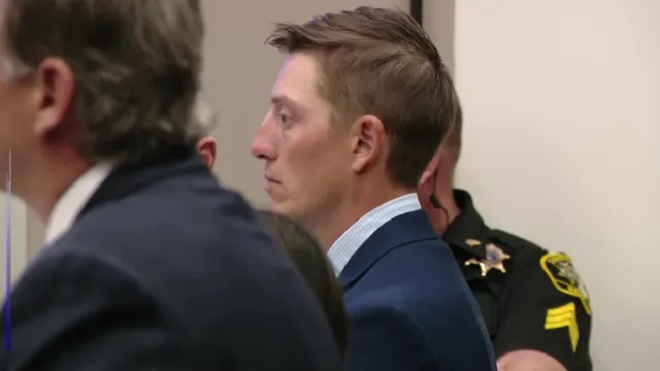GRAND RAPIDS, Mich. — The trial of former Grand Rapids police officer Christopher Schurr began on Monday, as the prosecution presented its case in the second-degree murder trial stemming from the fatal shooting of Patrick Lyoya on April 4, 2022. The case has garnered national attention due to the circumstances surrounding the shooting, which occurred following a traffic stop that escalated into a violent struggle.
On the first day of the trial, eight witnesses testified on behalf of the prosecution. Among them was neighbor Wayne Butler, who recounted witnessing the physical confrontation between Schurr and Lyoya. Butler, who observed the struggle from his front yard, described the tense moments leading up to the shooting and expressed his attempts to intervene.
Butler testified that he had pleaded with Lyoya to comply with the officer, urging him to “just stop, whatever you’re doing,” in the hopes of de-escalating the situation. “Just stop. Just stop. Like this is an officer of the law. In America’s history, this is how it ends every time,” Butler said, reflecting on the tragic outcome.
The prosecution presented video footage of the incident, which showed Schurr firing a single shot into Lyoya’s head after a struggle lasting approximately 2.5 minutes. The footage was shown to the 14-member jury, and the emotional toll on Lyoya’s family was evident, with Lyoya’s mother leaving the courtroom in tears.
Schurr had pulled over Lyoya for a traffic violation involving an expired license plate. The confrontation escalated when Lyoya, initially refusing to comply with the officer’s commands, got out of his vehicle. While Butler noted that Lyoya did not appear to physically assault Schurr, he did acknowledge that Lyoya was actively resisting and attempting to wrestle away Schurr’s Taser.
“He’s out of his car,” Butler testified. “That was the first thing: ‘Man, you’re not supposed to get out of the car.’” He also pointed out that both men appeared exhausted as the struggle wore on, with Schurr always maintaining the upper hand.
The trial further revealed details of Lyoya’s condition during the encounter. A blood alcohol test showed that Lyoya’s blood alcohol content (BAC) was 0.29, more than three times the legal driving limit of 0.08. Lyoya’s passenger, Aime Tuyishme, who was present in the car during the traffic stop, explained that Lyoya had spent the night before the incident drinking with friends. Tuyishme said the tension between Lyoya and Schurr became apparent quickly, and he decided to exit the car and record the encounter on his cellphone.
Tuyishme testified that both men appeared aggressive toward one another during the altercation. “It was two people going back and forth,” he said, noting the escalating nature of the confrontation.
The prosecution has indicated that it will call several expert witnesses to further bolster its case, with two experts expected to testify on Tuesday. The defense, which has yet to present its arguments, is expected to argue that Schurr acted in self-defense, citing the perceived threat posed by Lyoya during the struggle.
As the trial continues, the case remains at the center of a broader national conversation about policing, race, and the use of deadly force. Advocates for justice reform are closely watching the proceedings, as this case has once again raised questions about the accountability of law enforcement officers in encounters with Black individuals.
The trial is expected to continue throughout the week, with more witnesses and expert testimonies to come. The outcome of the case will likely have significant implications for both the community of Grand Rapids and the ongoing debate over police practices across the United States.







